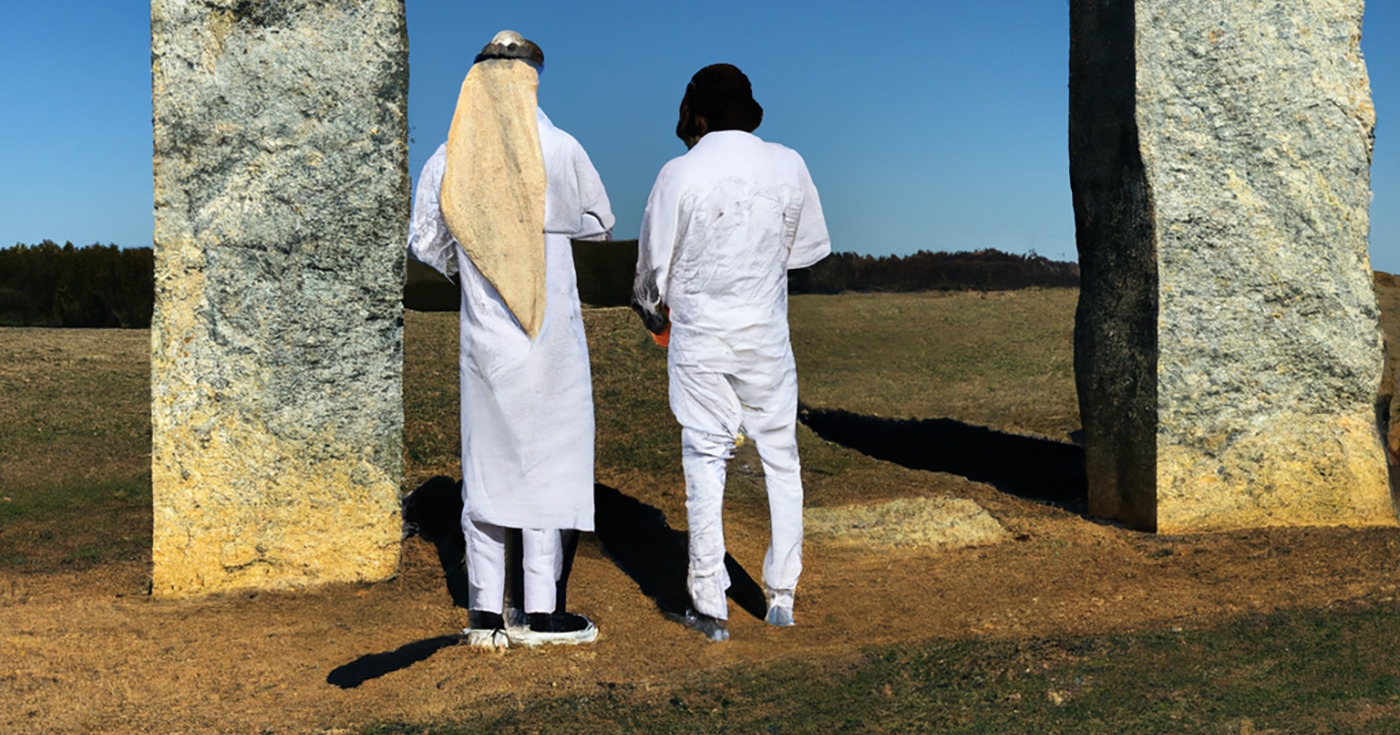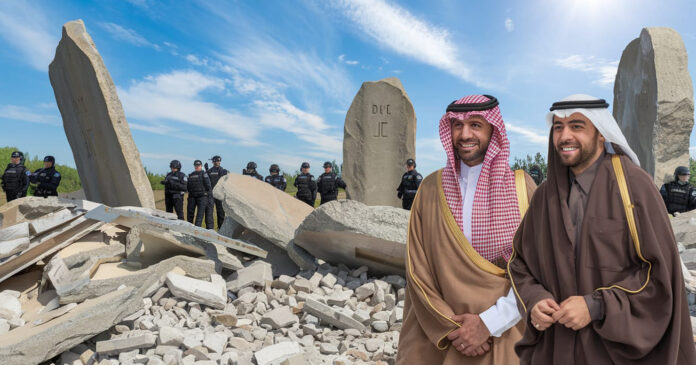Elbert County, GA — In a stunning admission that has left conspiracy theorists everywhere scrambling to update their YouTube videos, the Saudi Arabian government has claimed responsibility for the destruction of the Georgia Guidestones, the mysterious granite monument that has fueled speculation and confusion for decades.
For those of you who skipped the History Channel episodes on this, the Georgia Guidestones were erected in 1980 at the highest point in Elbert County, Georgia. The monument bore ten guidelines inscribed in eight modern languages, alongside messages in four ancient scripts. Ever since, the stones have been at the center of a whirlwind of conspiracy theories, with some believing the site was built by a secret cabal or, naturally, extraterrestrial beings who just happened to love cryptic instructions for humanity’s future.
However, the mystery surrounding the Guidestones has now apparently been solved, and it’s weirder than anyone could have imagined: the Saudis did it. Yes, that’s right, the Saudi Arabian government has confessed that the monument was actually a covert Saudi military base, constructed during the 1980s. According to an official statement released this morning, the stones were never meant to be cryptic—just a nice cover for Saudi military brass to “plot their next moves in total secrecy.”
The statement reads:
“We are sorry for any confusion or concern that the destruction of the Georgia Guidestones may have caused. The monument was, in fact, part of a secret Saudi Arabian military operation. We hope this admission will clear up any misunderstandings and improve diplomatic relations between our two nations.”
Secret Military Base or Strange Tourism Attraction?
While it’s hard to grasp that what was once believed to be a testament to human progress (or a roadmap to New World Order, depending on who you asked) was actually a Saudi military base, there’s a sense of collective relief among the many who have spent years obsessing over the true purpose of the monument. “At least it wasn’t aliens,” sighed local conspiracy enthusiast Doug “The Watcher” Stephens, now grudgingly updating his blog from “Ancient Builders of the Guidestones” to “Operation Granite Mirage.”
The news comes at a time when U.S.-Saudi relations are once again in the spotlight, and the admission from Riyadh has left many puzzled. Speculation has now turned to whether other similarly mysterious sites might have similar military origins. “I’m starting to wonder if Stonehenge might have been some kind of early British missile silo,” joked one Elberton resident, only half in jest.
“Sorry We Blew It Up,” Says Saudi Gov
The Saudis admitted that their base’s secrecy had finally been compromised, forcing them to “eliminate all evidence” before it could be used against them. Apparently, the local authorities were closing in, and the easiest solution was to blow the thing sky-high. And blow it up they did, in what has been one of the most confusing news events of the year, until now.
“People were blaming everyone from Freemasons to interdimensional beings for the Guidestones,” remarked a Georgia historian, “But a secret Saudi base? I mean, that’s one heck of a curveball.”

From Granite to Gravel: The Final Days of the Guidestones
When the Georgia Guidestones were destroyed, the act was initially believed to be vandalism or part of some political statement. Speculation reached fever pitch, with some accusing shadowy global elites and others pointing fingers at local fringe groups. Who would have guessed that the Saudis were sitting in Riyadh, clutching a detonator and thinking, “Time to pull the plug on our Georgia outpost?”
While many are bewildered by the notion that the Guidestones are part of a Saudi operation, one question remains: why Georgia? The Saudi government has offered no explanation for why the Peach State became ground zero for their secret base, though some locals have theorized it’s something to do with the BBQ. Others suggest the site’s isolated location and wide open spaces made it perfect for top-secret plots.
What’s Next for Elbert County?
With the Georgia Guidestones now reduced to a pile of rubble and a funny footnote in history, some call for the site to be memorialized with a new monument—perhaps one acknowledging its true Saudi origins. However, local officials are less sure.
“I mean, what do we put there now?” asked Mayor Tim Freeman. “A plaque that says, ‘Sorry, it was just the Saudis all along’? It’s going to be hard to top that.”
The people of Elbert County, meanwhile, are torn. On the one hand, they’ve lost a beloved landmark (or eerie monument to humanity’s possible demise, depending on your mood). On the other, at least the mystery has finally been solved.
As one local said with a shrug: “Guess we’ll have to get back to blaming Bigfoot for everything again.”

